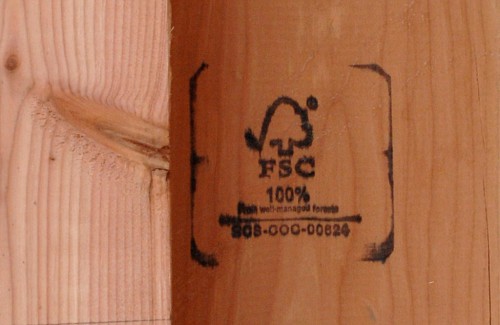As a woodworker, you can do your part to support environmentally responsible sustainable forestry practices by purchasing certified woods. Certified woods come from “well-managed” forests in which the long-term health of the total forest ecosystem is emphasized – the trees, under-story plants, water resources, wildlife habitats, recreational pursuits, and employment opportunities for local communities. A forest can become certified by meeting forest management standards established by a certification entity such as the Forest Stewardship Council (FSC). These standards ensure that forests are managed in an ecologically sound, socially responsible and economically viable manner.
Certification standards also cover the entire chain-of-custody from stump to shelf. For example, in order for wood to be labeled “FSC-certified”, it must be tracked from the forest, through manufacturing, distribution and to the final point of sale. The purpose of the chain-of-custody is to ensure that wood products endorsed by the FSC actually originate from well-managed forests. Chain-of-custody certifications primarily involve careful inventory management and record keeping.
So, where can you get certified wood? Certified wood products are not widely available at home improvement stores and lumberyards but that’s likely to change. Home Depot, for instance, has been steadily moving towards selling more FSC certified wood since 1999. And like a number of other companies, they have shifted buying wood from questionable sources to companies that practice responsible forestry (although not necessarily certified). To locate certified forest products suppliers in your area, check out the FSC or SFI’s online products database. Chances are you’ll find a source not too far from home. Just remember that certified lumber should have a stamp, label, or tag identifying it as such.
Prices for certified wood are generally higher than for non-certified wood owing to factors such as the extra labor involved in the certification process. But, as more certified products enter the market, prices are expected to decrease. Note that tropical hardwoods as well as domestic hardwoods and softwoods are all available as certified woods.
It’s an encouraging sign that a growing number of companies are using certified wood in their products. For example, the Gibson guitar company is now manufacturing its Les Paul Standard model from certified maple harvested by the Menominee Tribal Enterprises in Wisconsin and mahogany harvested by Sociedad de Productores Forestales Ejidales in Mexico. Since 1991, Herman Miller, a global supplier of office furniture, has purchased woods coming only from sustainable supplies. As another example, Maine WoodNet (MWN) is assisting a number of small to medium size wood products firms in marketing custom products such as conference tables that are made from certified woods harvested from local forests.


